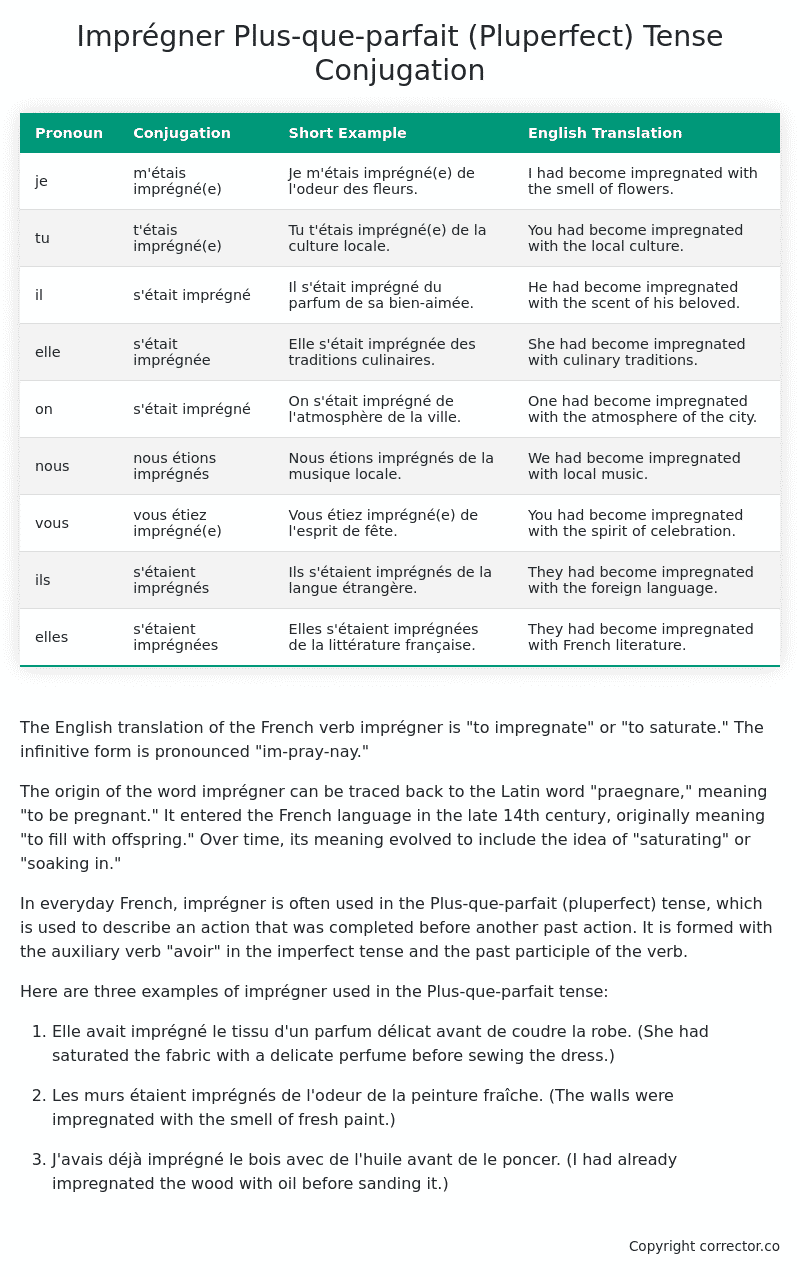Plus-que-parfait (Pluperfect) Tense Conjugation of the French Verb imprégner
Introduction to the verb imprégner
The English translation of the French verb imprégner is “to impregnate” or “to saturate.” The infinitive form is pronounced “im-pray-nay.”
The origin of the word imprégner can be traced back to the Latin word “praegnare,” meaning “to be pregnant.” It entered the French language in the late 14th century, originally meaning “to fill with offspring.” Over time, its meaning evolved to include the idea of “saturating” or “soaking in.”
In everyday French, imprégner is often used in the Plus-que-parfait (pluperfect) tense, which is used to describe an action that was completed before another past action. It is formed with the auxiliary verb “avoir” in the imperfect tense and the past participle of the verb.
Here are three examples of imprégner used in the Plus-que-parfait tense:
-
Elle avait imprégné le tissu d’un parfum délicat avant de coudre la robe.
(She had saturated the fabric with a delicate perfume before sewing the dress.) -
Les murs étaient imprégnés de l’odeur de la peinture fraîche.
(The walls were impregnated with the smell of fresh paint.) -
J’avais déjà imprégné le bois avec de l’huile avant de le poncer.
(I had already impregnated the wood with oil before sanding it.)
Table of the Plus-que-parfait (Pluperfect) Tense Conjugation of imprégner
| Pronoun | Conjugation | Short Example | English Translation |
|---|---|---|---|
| je | m’étais imprégné(e) | Je m’étais imprégné(e) de l’odeur des fleurs. | I had become impregnated with the smell of flowers. |
| tu | t’étais imprégné(e) | Tu t’étais imprégné(e) de la culture locale. | You had become impregnated with the local culture. |
| il | s’était imprégné | Il s’était imprégné du parfum de sa bien-aimée. | He had become impregnated with the scent of his beloved. |
| elle | s’était imprégnée | Elle s’était imprégnée des traditions culinaires. | She had become impregnated with culinary traditions. |
| on | s’était imprégné | On s’était imprégné de l’atmosphère de la ville. | One had become impregnated with the atmosphere of the city. |
| nous | nous étions imprégnés | Nous étions imprégnés de la musique locale. | We had become impregnated with local music. |
| vous | vous étiez imprégné(e) | Vous étiez imprégné(e) de l’esprit de fête. | You had become impregnated with the spirit of celebration. |
| ils | s’étaient imprégnés | Ils s’étaient imprégnés de la langue étrangère. | They had become impregnated with the foreign language. |
| elles | s’étaient imprégnées | Elles s’étaient imprégnées de la littérature française. | They had become impregnated with French literature. |
Other Conjugations for Imprégner.
Le Present (Present Tense) Conjugation of the French Verb imprégner
Imparfait (Imperfect) Tense Conjugation of the French Verb imprégner
Passé Simple (Simple Past) Tense Conjugation of the French Verb imprégner
Passé Composé (Present Perfect) Tense Conjugation of the French Verb imprégner
Futur Simple (Simple Future) Tense Conjugation of the French Verb imprégner
Futur Proche (Near Future) Tense Conjugation of the French Verb imprégner
Plus-que-parfait (Pluperfect) Tense Conjugation of the French Verb imprégner (this article)
Passé Antérieur (Past Anterior) Tense Conjugation of the French Verb imprégner
Futur Antérieur (Future Anterior) Tense Conjugation of the French Verb imprégner
Subjonctif Présent (Subjunctive Present) Tense Conjugation of the French Verb imprégner
Subjonctif Passé (Subjunctive Past) Tense Conjugation of the French Verb imprégner
Subjonctif Imparfait (Subjunctive Imperfect) Tense Conjugation of the French Verb imprégner
Subjonctif Plus-que-parfait (Subjunctive Pluperfect) Tense Conjugation of the French Verb imprégner
Conditionnel Présent (Conditional Present) Tense Conjugation of the French Verb imprégner
Conditionnel Passé (Conditional Past) Tense Conjugation of the French Verb imprégner
L’impératif Présent (Imperative Present) Tense Conjugation of the French Verb imprégner
L’infinitif Présent (Infinitive Present) Tense Conjugation of the French Verb imprégner
Struggling with French verbs or the language in general? Why not use our free French Grammar Checker – no registration required!
Get a FREE Download Study Sheet of this Conjugation 🔥
Simply right click the image below, click “save image” and get your free reference for the imprégner Plus-que-parfait tense conjugation!

Imprégner – About the French Plus-que-parfait (Pluperfect) Tense
Tense Formation
Common everyday usage patterns
Sequencing of past events
Background information
Hypothetical or reported speech
Interactions with other tenses
Summary
I hope you enjoyed this article on the verb imprégner. Still in a learning mood? Check out another TOTALLY random French verb conjugation!


